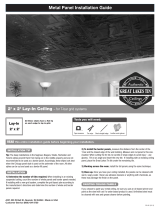Page is loading ...

Tape
measure
Tin snips
or scissors
Utility
knife
Steel
straight
edge
Loctite
®
PL Premium
®
or PL Premium
®
Fast
Grab adhesive
Tools and items you will need:
Isopropyl
alcohol
(optional)
2' x 2' Glue-Up Ceiling
– for direct surface application
All these styles have 1/2" Flap Lip for
Overlapping Connection:
Dunes V, Dunes H, Current V, Current H,
Echo, Typhoon, Cyclone
Glue-Up
2' x 2'
Tub and Trowel
Adhesive Application
Tube Adhesive
Application
or
1/8" tooth
notched
trowel
Measure and cut border panels. Measure and cut the border panel to the
previously determined size. After cutting the panel and before applying glue,
clean the back surface of the panel by wiping with a clean cloth and rubbing
alcohol. Refer to manufacturer's directions. Use rubbing alcohol in a well-
ventilated area away from ignition sources.
The preferred method for installing Glue-Up
panels is to apply the adhesive directly to the back
of the ceiling panels using Loctite
®
PL Premium
tube adhesive in a 1/8" diameter bead. Or use
tub adhesive. In both cases, we recommend
spreading the material out on the panel evenly
with an 1/8" trowel shown to right.
Keep adhesive about 1/2" from the outside edges to prevent leakage. Carefully
read and follow manufacturer’s directions for the adhesive.
1) Edge Trim. If applying to
perimeter of room, install now.
2) Installing rst panel. If you
chose to apply Edge J-trim to panel
before installing, insert panel into
to trim. Place this rst panel at
the corner farthest from the main
entrance of the room.
3) Overlap. Overlap subsequent
border panels by laying your next
panel on top of the previous panel's
1/2" Flat Lip overlap connection.
4) Working in rows across the
room, add panels in order according
to diagram to the right.
Install the full panels by overlapping
each new row over the previous
row. Complete each row by cutting and installing the remaining border panels if
applicable.
Tip: You must remove any adhesive that gets on the nished side of the panel before
it dries. Using a cloth or paper towel, clean off any residue with mineral spirits.
One hour after the ceiling has been completed, rmly press on ALL the ceiling
panels you’ve installed to ensure proper bonding and adhesive set-up.
Once you have your ceiling installed, the panels can be cleaned with warm,
soapy water. Never use abrasive cleaners, scouring pads or anything with harsh
chemicals.
For speeding up cure time, after applying the Loctite PL Premium adhesive to
panel, lightly spray the adhesive with a ne mist of clean water after applying to
panel. This will help the adhesive cure.
INSTALLATION
PREPARATION
TRIM INSTALLATION TIPS
If Edge J-trims were purchased for
nishing off your ceiling edges, you can
attach the trim to the ceiling panels or
to the ceiling along the perimeter, before
installing the ceiling panels. If applying
the trim to perimeter of ceiling rst,
the trim can be bonded to the ceiling
using Loctite PL Premium adhesive by
applying a 1/8" bead to the back of the
trim and pressing rmly on to the ceiling.
Nails or staples can be used to tack trim
in place until adhesive is cured.
NOTE: If you purchased Crown Molding
to nish your edges, you can go to fasadeIdeas.com for more information.
Clean surfaces. Before starting, make sure all surfaces are clean, dry, at,
smooth, and free from dust, grease, etc. Lightly sand any glossy surfaces to
remove sheen.
Understand the overlap feature. Prior to
installation, it is important to understand the
overlap feature of each panel. Each panel has
two
1/2" at lips for overlapping. Arrange all
panels this way so additional panels can be
added to the top or right side of any panel.
Where 4 panels intersect. When overlapping
4 panels, it is necessary to cut a 1/2" notch in
panels 2 and 3 to avoid an overlap buildup that
causes a “bump.” (See drawing to right)
Determine the room layout. Map your ceiling
on graph paper before beginning installation. Locate and draw any light xtures,
heating vents, intersecting hallways, closets and doorways. Occasionally these
features can inuence starting points, tile placement and nished ceiling design.
To ensure professional looking results, the room layout should be balanced with
panels centered in the room and equal size border panels used on opposite sides
of the room. To nd out what size to cut the border panels in one direction, see the
formula below. Then repeat formula for other direction.
Formula: Example
• Measure room in one direction 17' 6"
• Round down to closest even number of feet 16'
• Subtract those numbers 17' 6" – 16' = 18"
• Add 24" 18" + 24" = 42"
• Divide by 2 to get border tile size 42" ÷ 2 = 21"
Establish your string (or chalkline) at this measurement (see above). These lines
should be parallel with the walls and will help you align the rst border panels. If
your room is out of square, adjust accordingly.
CAUTION: Even though these panels are “Class A” re rated, they can be deformed with excessive
heat. Never expose to heat over 140˚F.
Never use abrasive materials such as scouring pads to clean surface; use only a soft cloth or sponge
with mild soap and water.
INSTALLATION TIP
READ this entire installation guide before beginning your installation
Nails or
staples for
J-Trim
½" Flat Lip
overlap area
½" Flat Lip
overlap area
½" Flat Lip
overlap area
½" Flat Lip
overlap area
top panel
/






